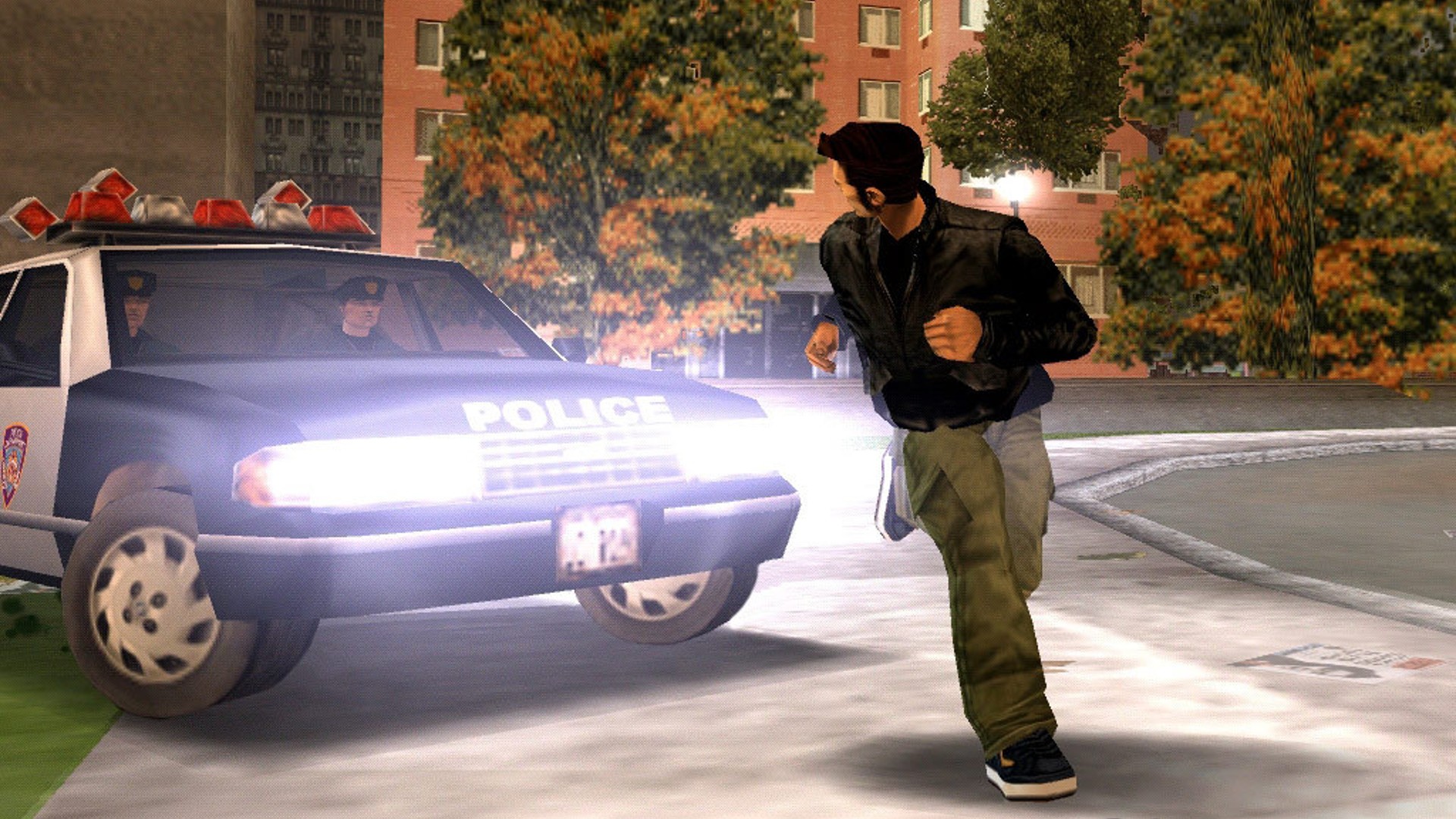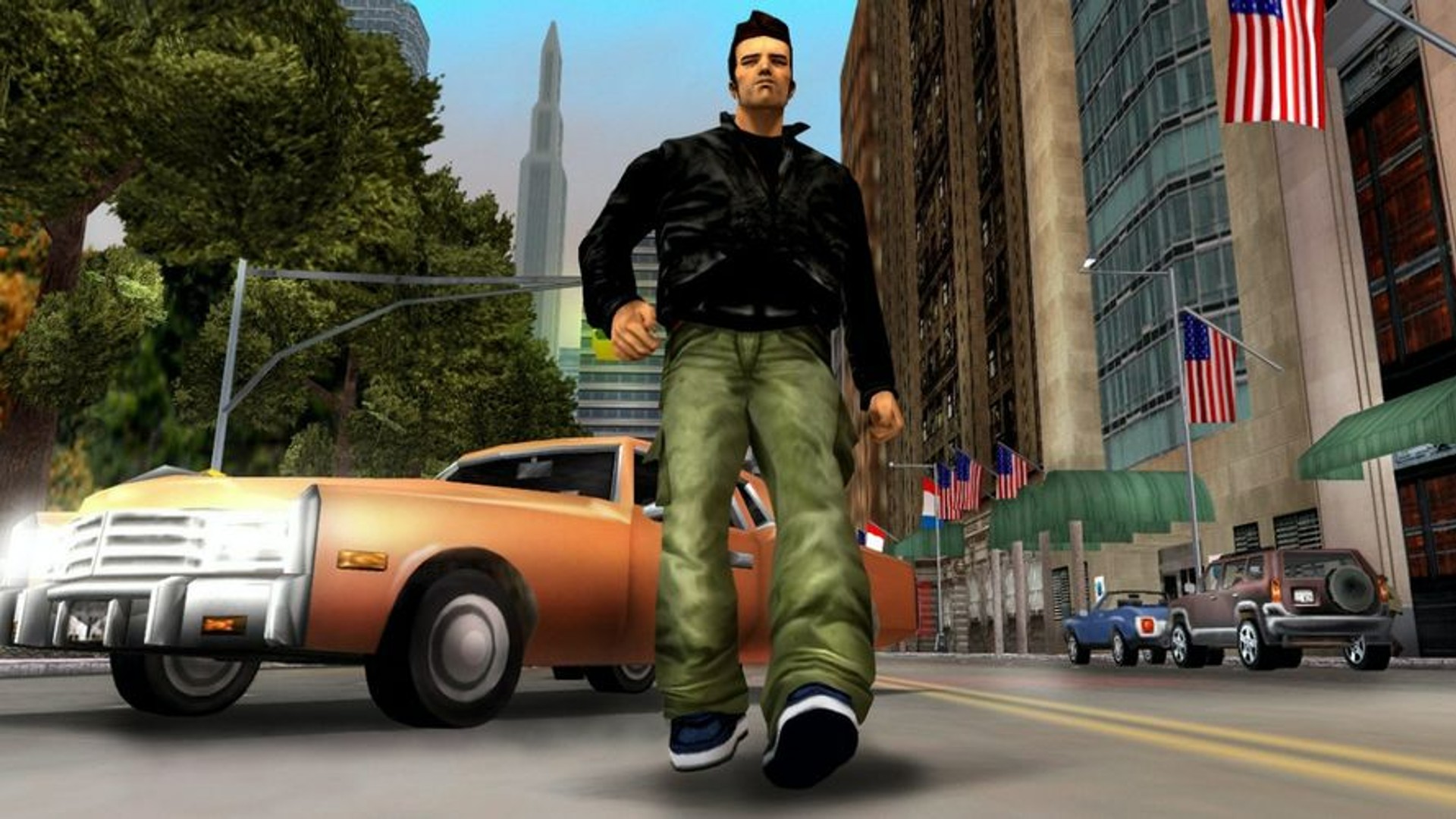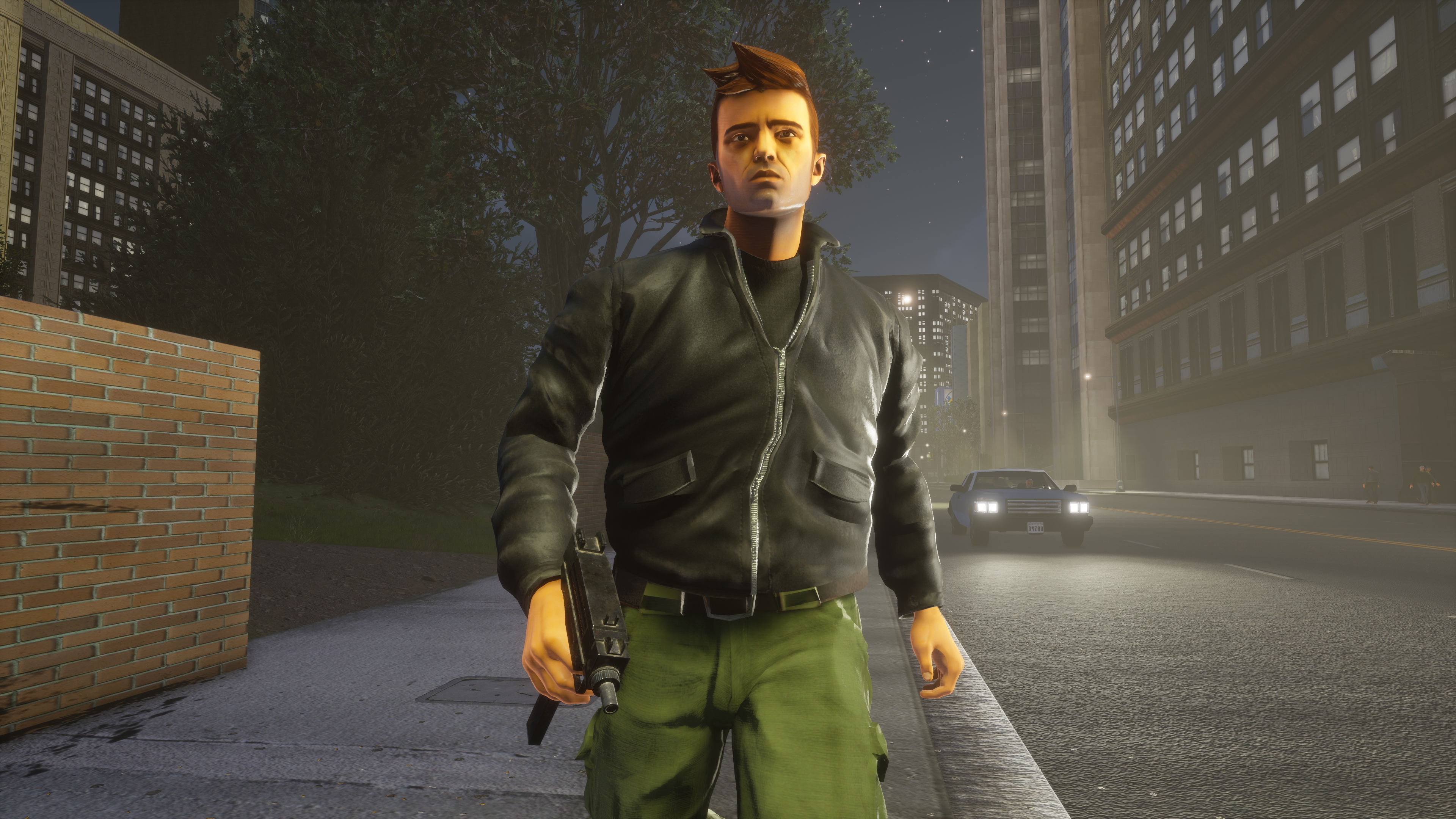The secret to Grand Theft Auto's success? "The point was not the controversy, it was the empowerment"
Former DMA Design dev Brian Baglow reflects on the transition from 2D to GTA 3's 3D domination

When developer DMA Design launched Grand Theft Auto in 1997, it caused one hell of a shit storm. The top-down crime simulator that portrayed low-res sprites stealing cars and murdering police officers hit the tabloid news headlines like a bullet. It was too real, despite not really looking real at all. Newspapers went to town, politicians lost their heads, and, at one point, the first GTA was even denounced in the houses of British parliament.
“The controversy was not the point. We didn’t set out to create the most controversial game or to shock or outrage or upset – we set out to, basically, rip off every heist movie, every crime caper, every cultural reference from book and film that we could get our hands on,” says Brian Baglow, the founder and director of the Scottish Games Network, and former DMA Design dev, latterly of Rockstar North. “Because, if you think back to the original game, everything was implied. It was top down, you couldn’t see inside buildings, all the mission stuff came from a pager that gave you, I think it was, 110 characters which could only be triggered by driving over specific spots on the map.”
“You couldn’t really have a massive amount of plot, you couldn’t really have shocking storylines, so an awful lot of what was controversial was taking place in people’s heads. As the series has evolved, not least with GTA 3, that has changed, but in all the right directions.”
Scottish roots

“You couldn’t really have a massive amount of plot, you couldn’t really have shocking storylines, so an awful lot of what was controversial was taking place in people’s heads. As the series has evolved, not least with GTA 3, that has changed, but in all the right directions.”
Brian Baglow
Prior to Rockstar’s takeover of Dundee-based developer DMA Design, Baglow worked on the first and second GTA games as a writer, while also handling much of the games’ PR. Four years in the making, Grand Theft Auto itself had begun life as a cops and robbers-type racer named Race and Chase, wherein players took control of the authorities in an open world playground – a feature underused at the time due to technology constraints. Thing is, controlling police officers in an ambitious game world was boring, and all of the fun stuff – you know, knocking over pedestrians, running red lights, tearing up public parks, and generally breaking the law – could only be justified on the other side of the divide: on that of the criminals.
And so the controversy which has followed the enduring crime sim since was born, persisting in recent years as a result of the graphical fidelity facilitated by modern-generation hardware. GTA 3, of course, was the series’ first foray into 3D, delivering a new layer of realism, and, for some, terror in the process. For Baglow, this was very much an evolutionary thing. Having moved exclusively into PR at Rockstar in the lead up to GTA 3’s release, he was however pleased to see the third main series game building and growing what he and his colleagues at DMA had started.
“If you look at GTA 3, it took all of the fun stuff, all of the best bits out of GTA 1 and GTA 2 and stuck them into 3D,” says Baglow. “It did so many things so very well, but at its core, a lot of the capabilities were in GTA 1, it’s just that all of a sudden you could put it in 3D, and when you do that, all of these opportunities present themselves. Like, ‘oh, a baseball bat, let’s get that in there.’ We had a baseball in GTA 1, and the question was: what’s the difference between that and a punch for the little top-down figure? Nothing. Okay, get it out of there then. We were quite ruthless in terms of culling stuff because the technical capabilities weren’t there. We had to design to the least capable platform.”
“The moves to 3D would have happened quite naturally, I think, and if we could have made GTA 1 3D we would have. We were at a time when Doom had given way to Quake, and Quake had given way to Unreal Engine. Tomb Raider had moved on to Tomb Raider 2, Half-Life was there. I remember the joy of multiplayer games of Half-Life at lunchtime in the studio and being wowed by these fully 3D environments with multiple players all playing at once. The industry had made it possible for GTA 3 to happen.”
Sign up to the GamesRadar+ Newsletter
Weekly digests, tales from the communities you love, and more


20 years later, Rockstar reflects on how GTA 3 "showed us the first glimpse of what was possible"
During its development, the first Grand Theft Auto was almost cancelled several times. GTA 2’s gang system was revolutionary, yet its ‘10 minutes into the future’ setting and premise didn’t quite hit the mark with players. With Baglow now working in PR ahead of the series’ first game under Rockstar North and to be released on PlayStation 2, he would have been more aware of the hype machine and its potential to make or break promising games more than most.
At that point, was there a moment when he realised GTA 3 was going to be big?
“There were several,” he says. “There were quite a few where it was clear there was going to be a massive reaction to this, and it happened in dribs and drabs. It wasn't that it came out and it changed the world. It came out, and it got good reviews. But the last two games had received really good reviews. Gaming itself had grown, in a large part due to the console manufacturers like Sony and Nintendo. Sega was just dipping out with the Dreamcast. The PlayStation made gaming cool; it took it out of the living room and stuck it in clubs, and made it something cool, young people might like to enjoy. The gaming audience had been growing alongside the technology.”
“But there were so many little bits and pieces. I remember I flew into New York and I was wearing a GTA 2 t-shirt. I got to the airport in New York, and a border patrol said to me, ‘GTA 2? Is that the game?’ I said, yeah, I work at Rockstar, and he was like, ‘Oh my god! I hear number three is coming out, I’m getting it!’ At that point, I knew it was going to be quite big.”
“You saw it grow in little ways, with unexpected people mentioning it. Way back when we were doing number one, I had been doing a bit of guerilla marketing on my own by just emailing people, saying, ‘hey, we've just done this game where you can steal cars and shoot people’. One of the organisations I had emailed was Quentin Tarantino's production company, A Band Apart, and never got a reply. That is, until GTA 3 came out. They had emailed somebody – it wasn't me, I was no longer with the company – but they reached back out and were like, ‘nice game, can I get a free copy?’. Even though I’d left what was then Rockstar by this point, I was getting emails from record companies and music publishers I’d run into over the previous years looking for free copies – with the offer of reciprocal CDs or DVDs or whatever it was at the time. When Tarantino’s company got in touch looking for copies, that’s when I knew how big it was. That was the point where I thought GTA 3 could be really quite big for the series from thereon.”
Time flies

"When Tarantino’s company got in touch looking for copies, that’s when I knew how big it was. That was the point where I thought GTA 3 could be really quite big for the series from thereon.”
Brian Baglow
Now, 20 years since the launch of GTA 3, and 24 years since the arrival of the first Grand Theft Auto, Baglow looks back with pride, but also in astonishment. He’s immensely pleased to have helped put GTA on the map in its early days, and has been consistently impressed with the heights the series has, and continues to reach today. For Baglow, Grand Theft Auto stands alone. Sure, the likes of Saints Row and modern iterations of Driver, for example, have offered their own takes on the tried and tested formula, but none have come close to Rockstar’s open world juggernaut. Red Dead Redemption is perhaps the closest impersonator, which has taken GTA’s recipe and retrofitted it with spurred boots and horses.
Baglow is then adamant that not obsessing over the controversy in the late ‘90s was the right call. For him, doing so might even have derailed the series, preventing it from flourishing in the way it has over the last 20-some-odd years. Which is to say: Grand Theft Auto is a crime simulator with carjacking, firefights, and nefarious behaviour at surface level, but at its heart, it’s about giving players freedom, and letting them have fun.
“For me, that's the most astonishing thing: it's not been cloned, it's not been copied, it's not had a million imitators out there, because who can actually imitate it? There’s a reason that GTA 5 is still making money today, eight years after it first launched. GTA Online just had its best year ever. People are not getting sick of it. People are not switching off. And if we’d focused solely on the controversy way back at the start, if we’d focused on the car theft and crimes, I don’t think that passion would have lasted beyond a very few games. The point was not the controversy, it was the empowerment, giving players the opportunity to try stuff, and rewarding them accordingly.”
“The bottom line, with GTA 1 and GTA 2, with which I was directly involved, and with GTA 3 from the outside looking in, it's been about fun. It's been about making something fun. I think it's been really subversive. While the outrage and the moral hysteria has been there, it’s really dark-humored, tongue-in-cheek and it speaks to people – the same you get from dark films. You’re a little bit uncomfortable. You only have to play a tiny bit of the games to realise that – and that applies to the first games, the third and all of the games that have come after that again.”
We can't say for certain what Rockstar's next game is all about, but that hasn't stopped us speculating on the latest GTA 6 news and rumors.

Joe Donnelly is a sports editor from Glasgow and former features editor at GamesRadar+. A mental health advocate, Joe has written about video games and mental health for The Guardian, New Statesman, VICE, PC Gamer and many more, and believes the interactive nature of video games makes them uniquely placed to educate and inform. His book Checkpoint considers the complex intersections of video games and mental health, and was shortlisted for Scotland's National Book of the Year for non-fiction in 2021. As familiar with the streets of Los Santos as he is the west of Scotland, Joe can often be found living his best and worst lives in GTA Online and its PC role-playing scene.


